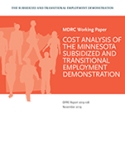Cost Analysis of the Minnesota Subsidized and Transitional Employment Demonstration

 Introduction
Introduction
The Minnesota Subsidized and Transitional Employment Demonstration (MSTED) is testing the effectiveness of subsidized employment for individuals enrolled in the Minnesota Family Investment Program (MFIP), Minnesota’s Temporary Assistance for Needy Families program, who were unable to find employment after participating in the state’s existing welfare- to-work program. MFIP employment counselors, who work with adults expected to meet the federal work activity requirements while receiving cash benefits, referred individuals struggling to find employment to MSTED. MSTED placed participants into two different types of subsidized employment based on their job readiness: Participants who were less job ready were placed in temporary paid work experience in the nonprofit and public sectors, and participants who were more job ready were placed in subsidized jobs in the private sector designed to roll over into unsubsidized permanent positions. The primary goal of the program was to move participants into unsubsidized employment.
To learn about the program’s effects and costs, the Administration for Children and Families in the U.S. Department of Health and Human Services funded a random assignment evaluation of MSTED, in which individuals were randomly assigned to a program group that had access to MSTED services or to a control group that did not have access to MSTED services but could receive other welfare-to-work services. In the first year after random assignment when program group members who had been placed in subsidized employment were still receiving subsidized wages, program group members were more likely than control group members to have been employed. However, by the end of the second year after random assignment when subsidies had ended, program and control group members were employed at similar levels.
This paper presents the per-person cost of MSTED, as well as the costs of other services that all sample members may have received:
- MSTED services: Participants who were assigned to the program group were offered MSTED services. These services included working with job developers who assessed their job readiness; provided any needed job-readiness support, including connecting them to workshops and one-on-one training; and helped them find subsidized employment. The program paid for the subsidized portion of participants’ wages.
- MFIP services: Both program and control group members were enrolled in MFIP and received some level of employment services from MFIP employment counselors. They also received funds for child care and supportive services through MFIP.
- Education and training services: Some participants fulfilled the MFIP work activity requirements by participating in education or training services. These services were not typically paid for by MSTED or MFIP providers but were paid by outside agencies.
This study is part of a larger demonstration funded by the Administration for Children and Families in the U.S. Department of Health and Human Services, called the Subsidized and Transitional Employment Demonstration (STED), which is testing various subsidized employment strategies in several locations across the country. Longer-term findings from all STED random assignment evaluations are included in a separate synthesis report, while earlier findings discussing the implementation of MSTED and its early impacts are in a separate interim report.
Purpose
The purpose of the cost study is to determine what it cost to provide MSTED services to a single program group member once MSTED had reached a steady state of operation. The analysis estimates the costs per sample member in three categories: MSTED costs, MFIP costs, and education and training costs.
Key Findings and Highlights
- The cost of MSTED program services averaged $5,442 per program group member. Program group members received an average of $654 in subsidized wages.
- The cost of MFIP employment services averaged $485 per program group member and $1,010 per control group member, and the cost of supportive services and child care accessed through MFIP averaged $6,234 per program group member and $6,609 per control group member.
- Education and training costs averaged $1,393 per program group member and $1,581 per control group member.
- The net cost, the difference between the total program group costs and the total control group costs, averaged $5,009 per program group member.
Methods
The cost of MSTED was assessed using program expenditure reports, program survey data, and public data sources. The cost of MSTED program services were estimated by summing direct program expenditures and dividing by the number of program group members. To estimate the cost of MFIP services and education and training services, the research team first determined the unit cost, or the cost of serving one person for a specific unit of time (for example, one month). Multiplying the unit cost by the average length of time sample members received each service gives the average cost incurred per sample member.






